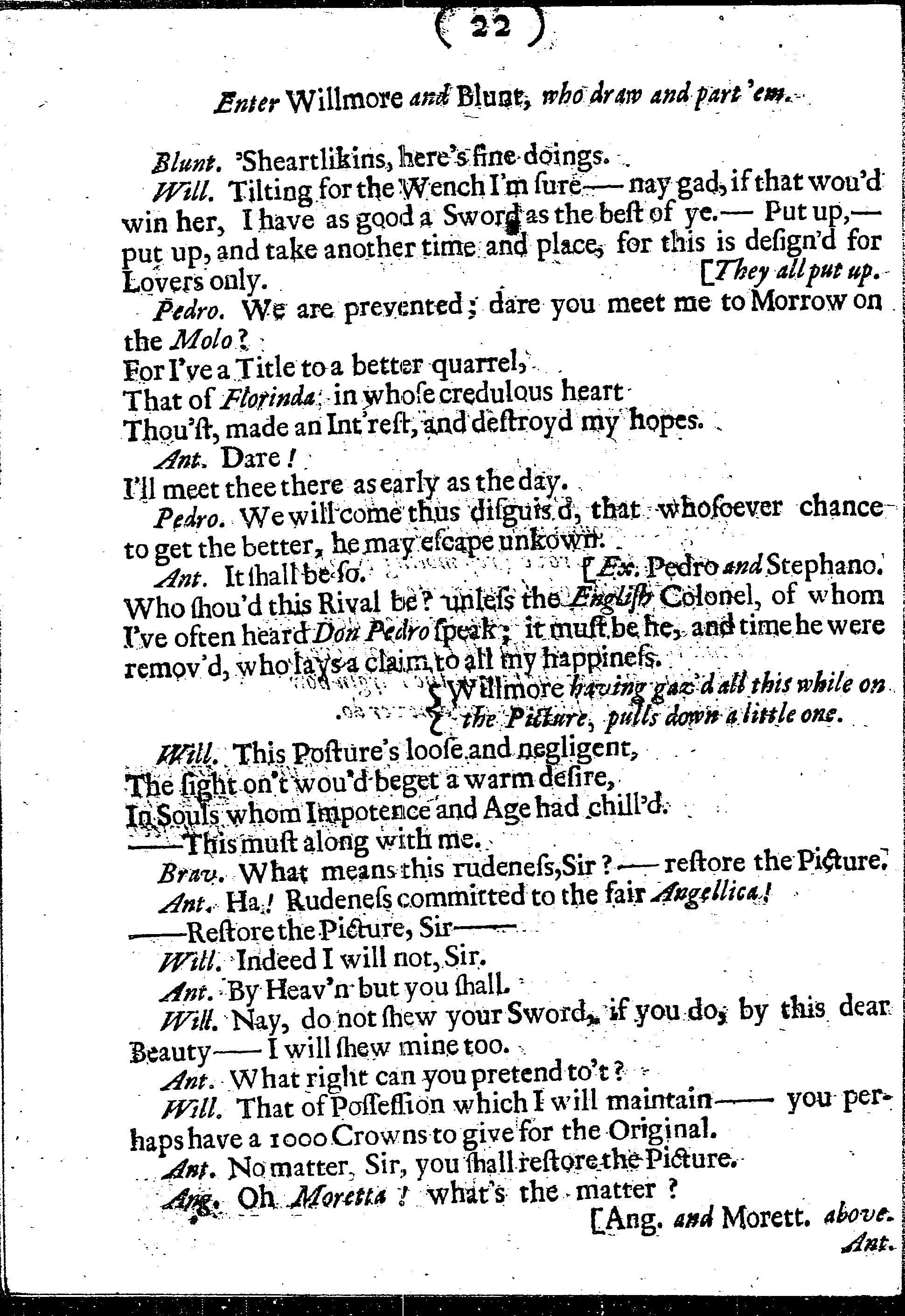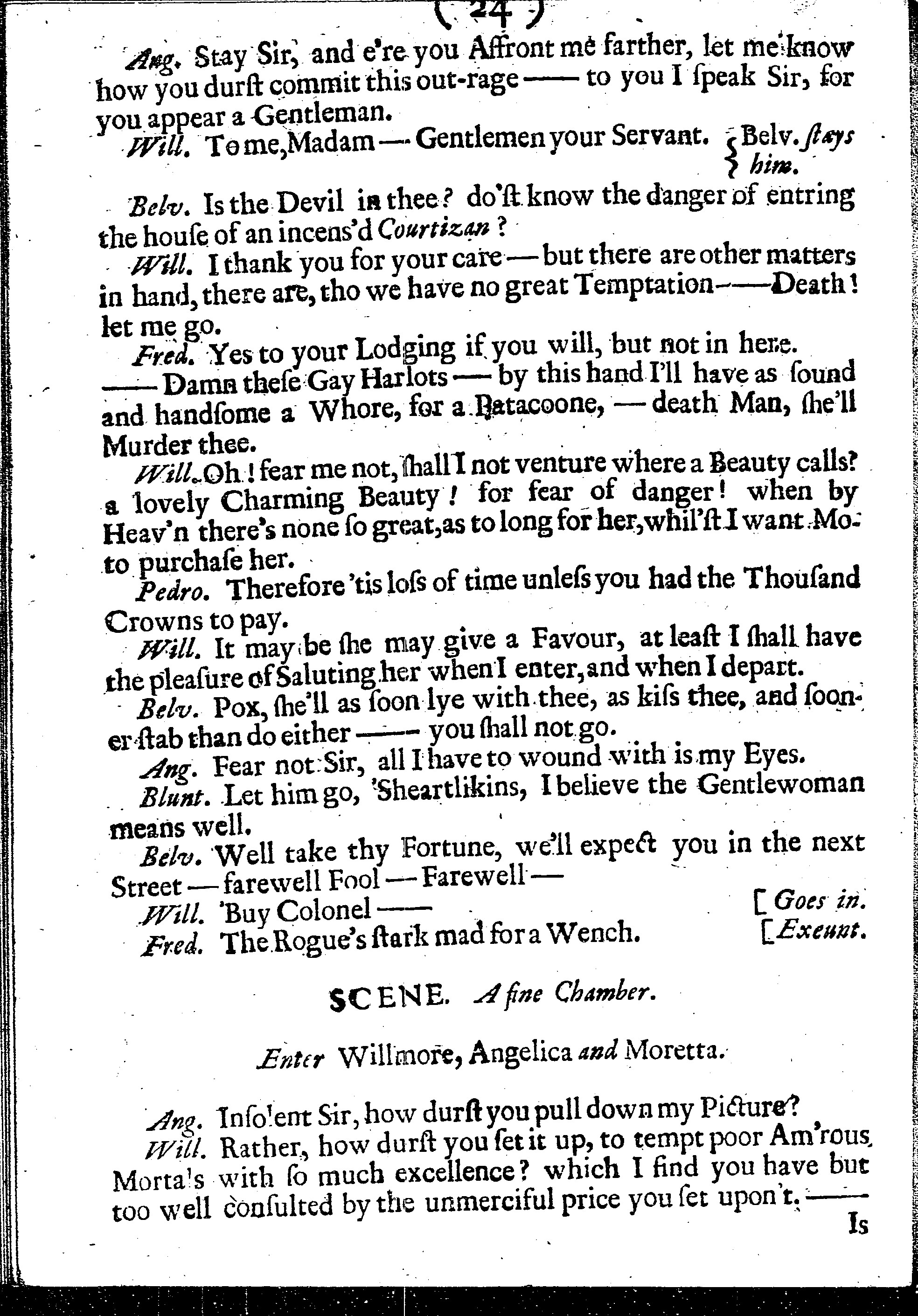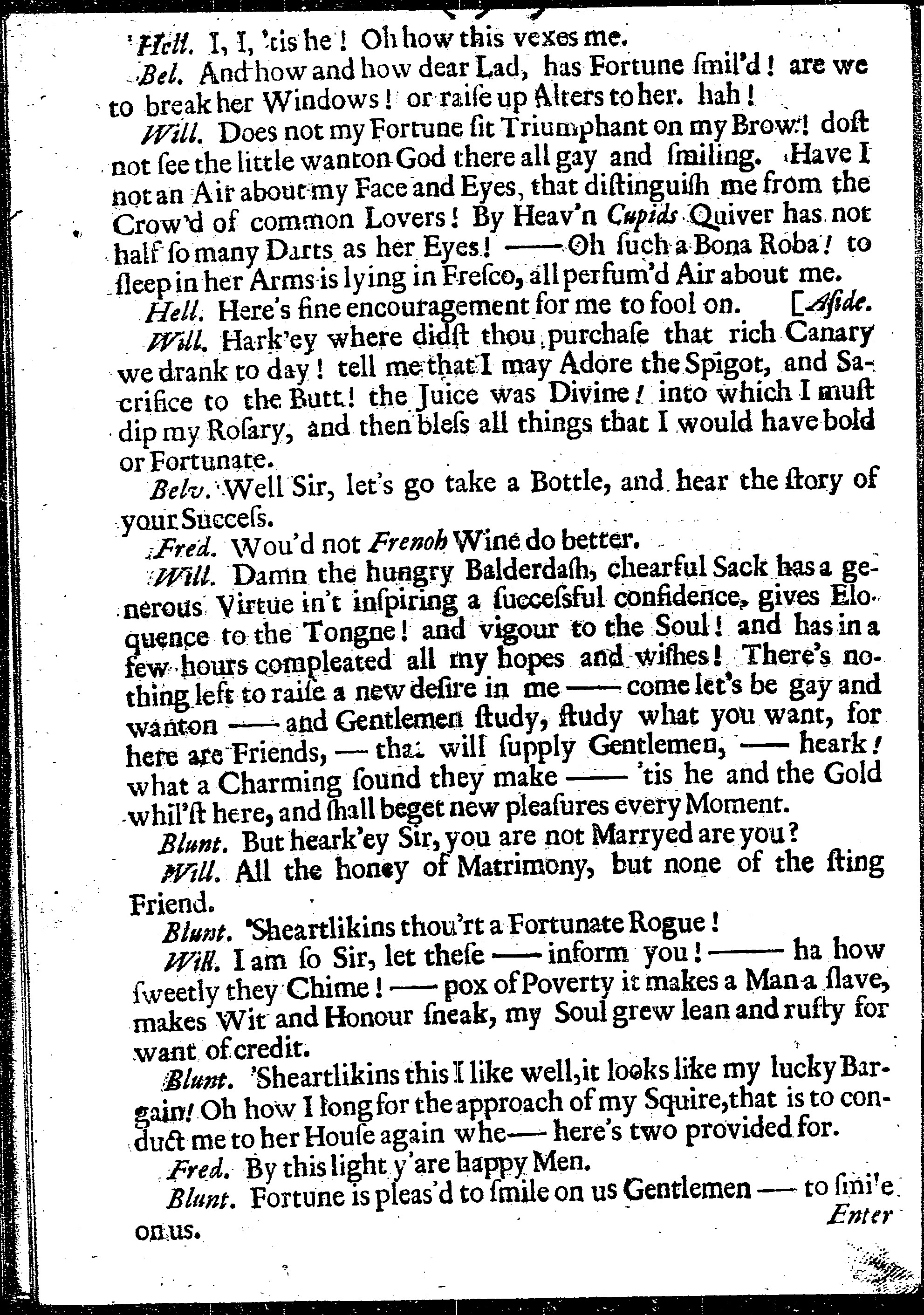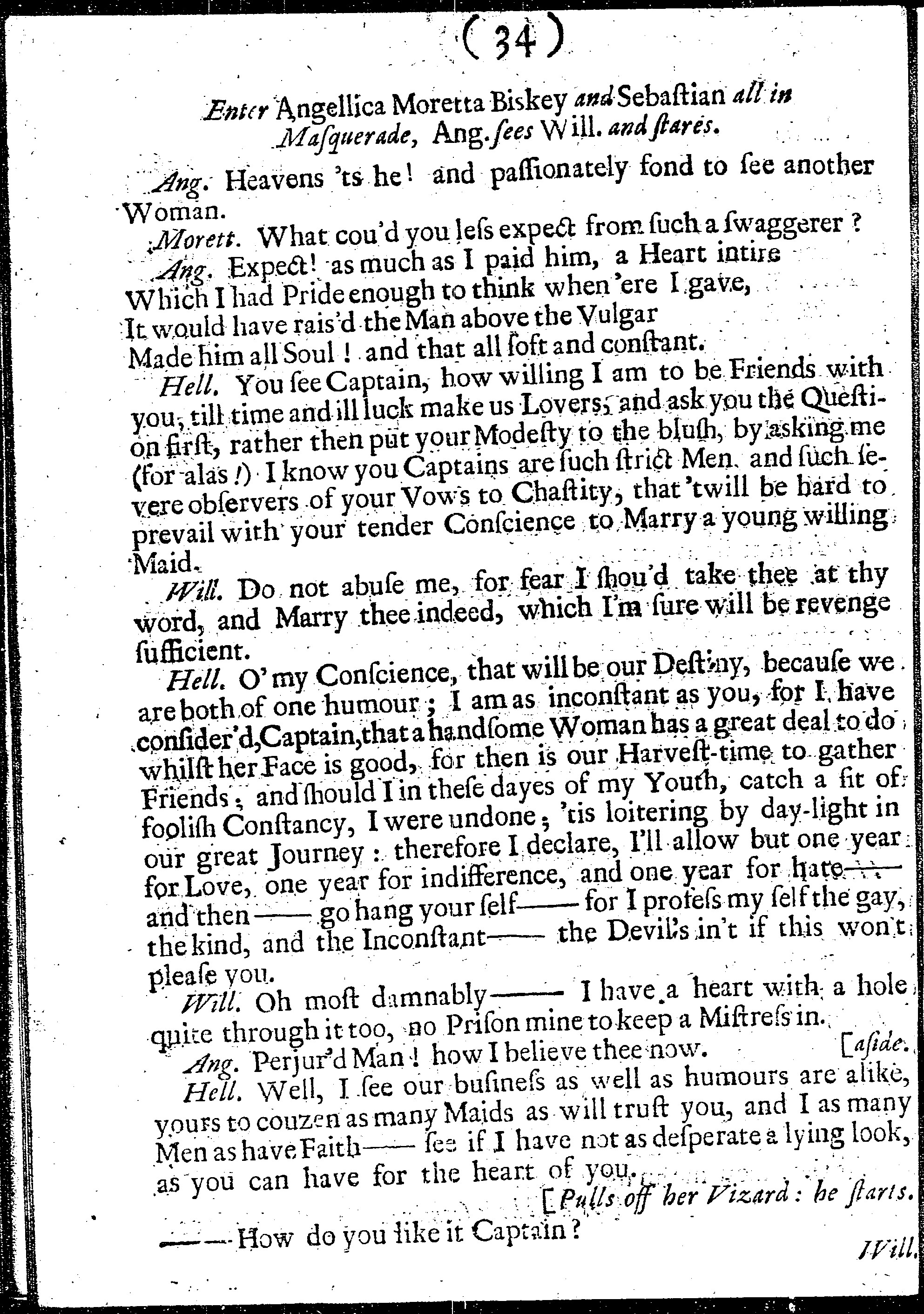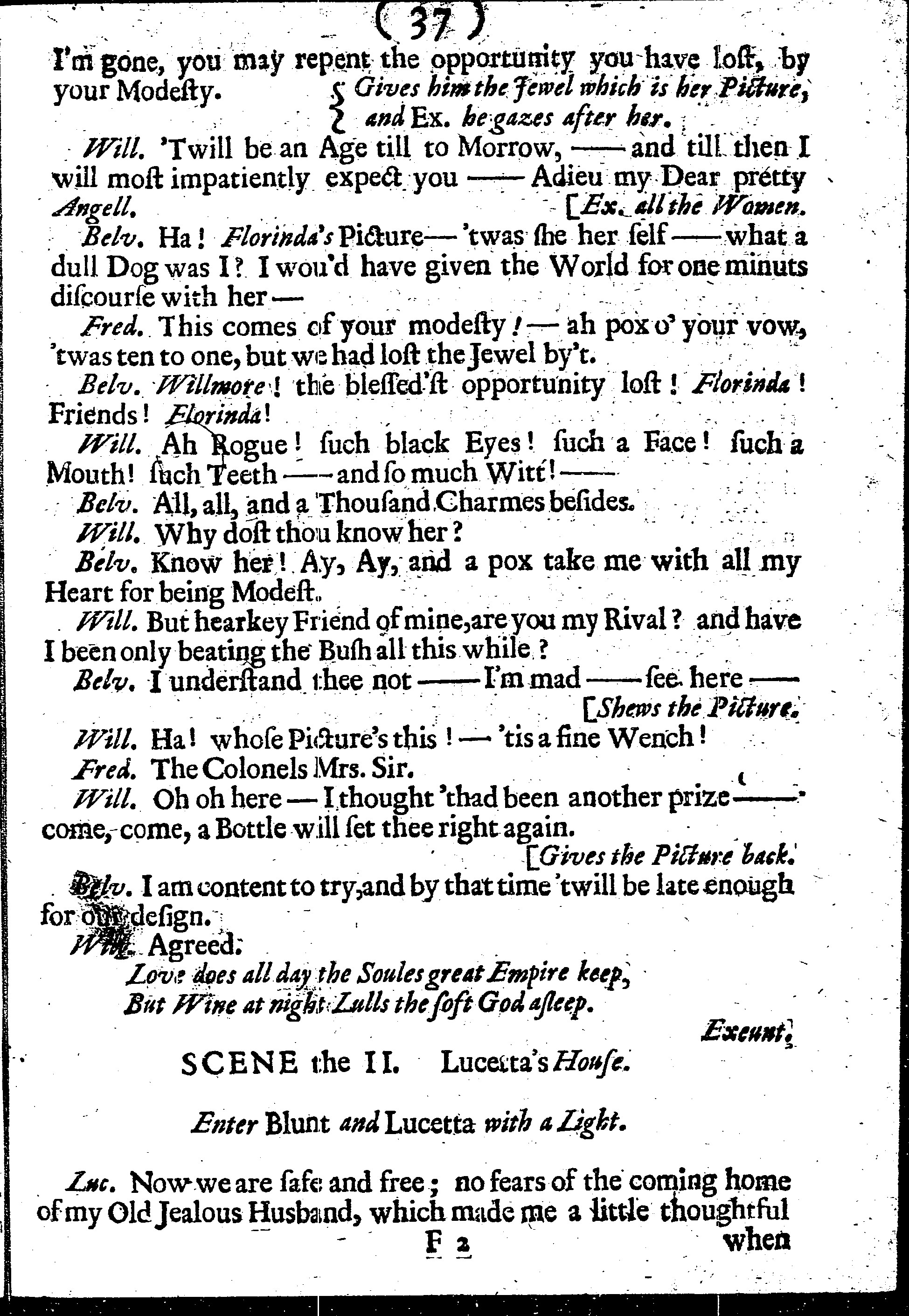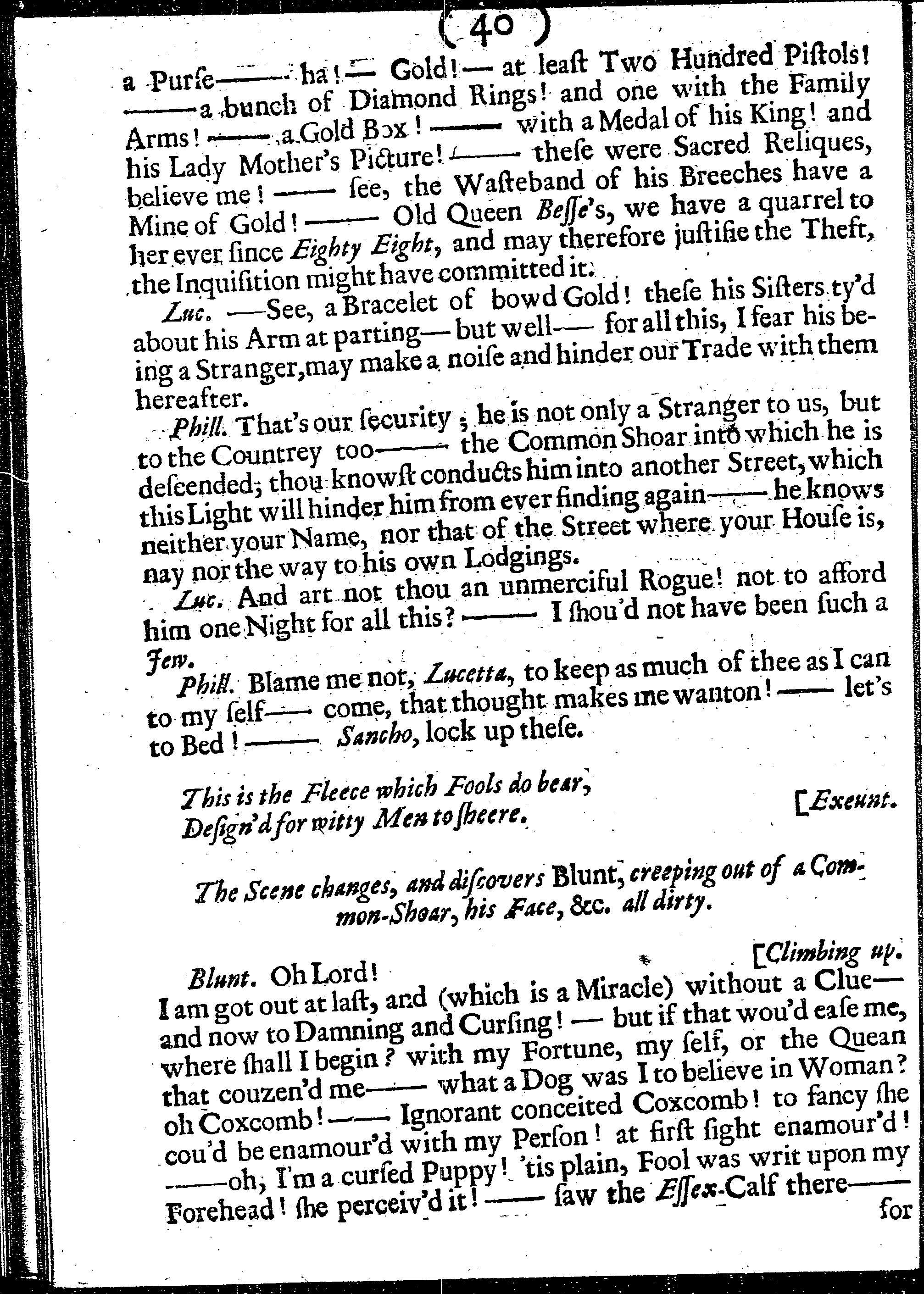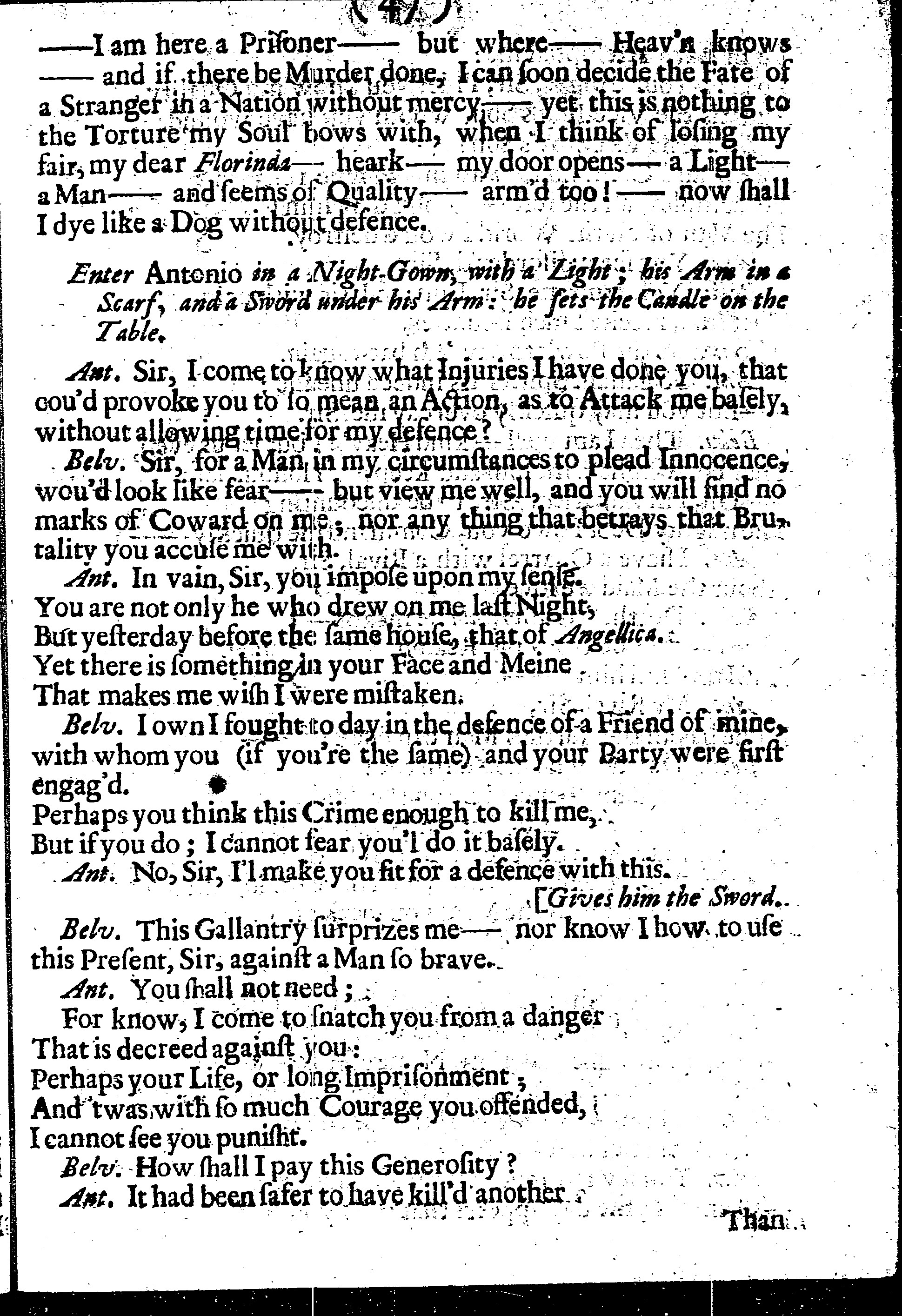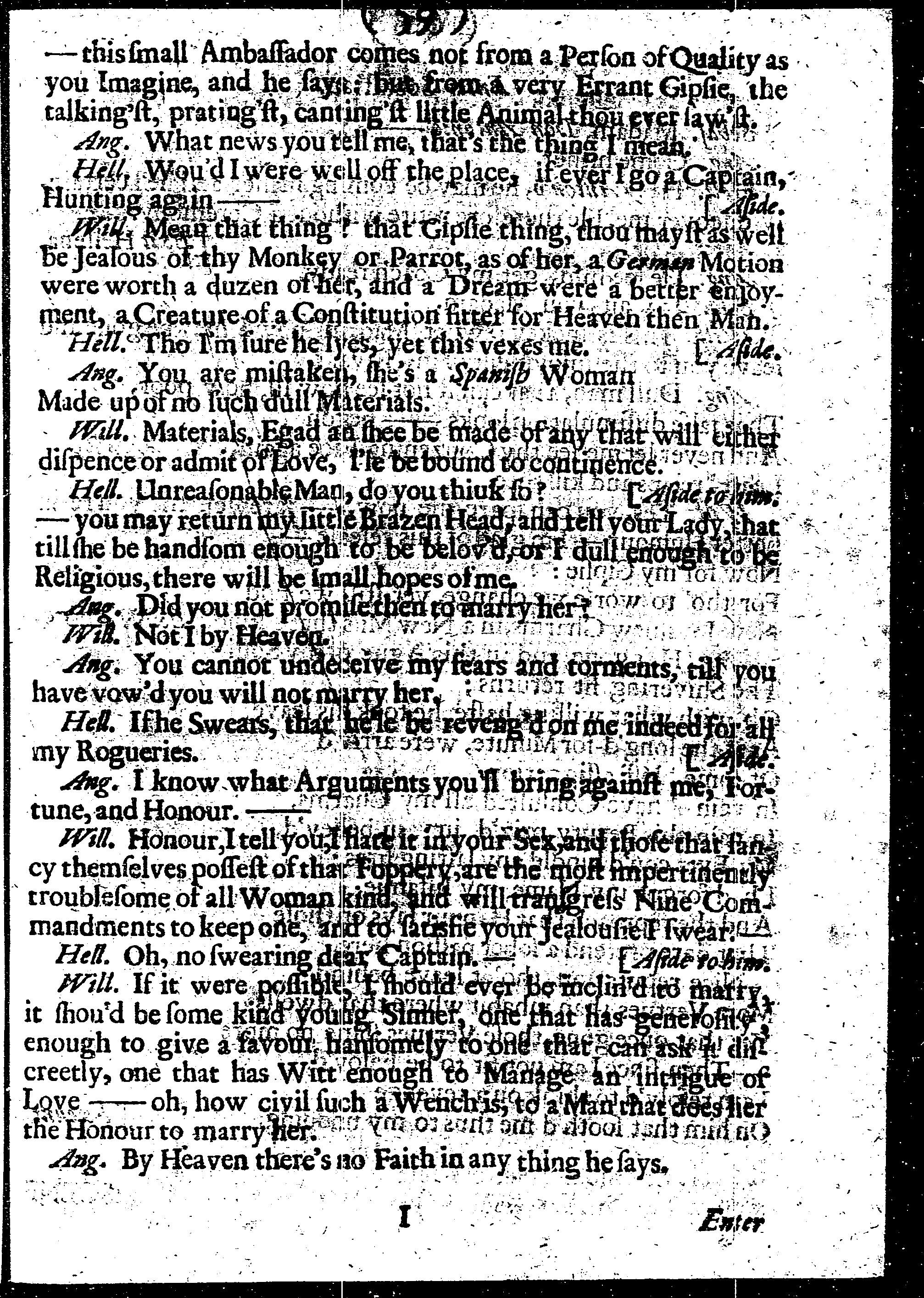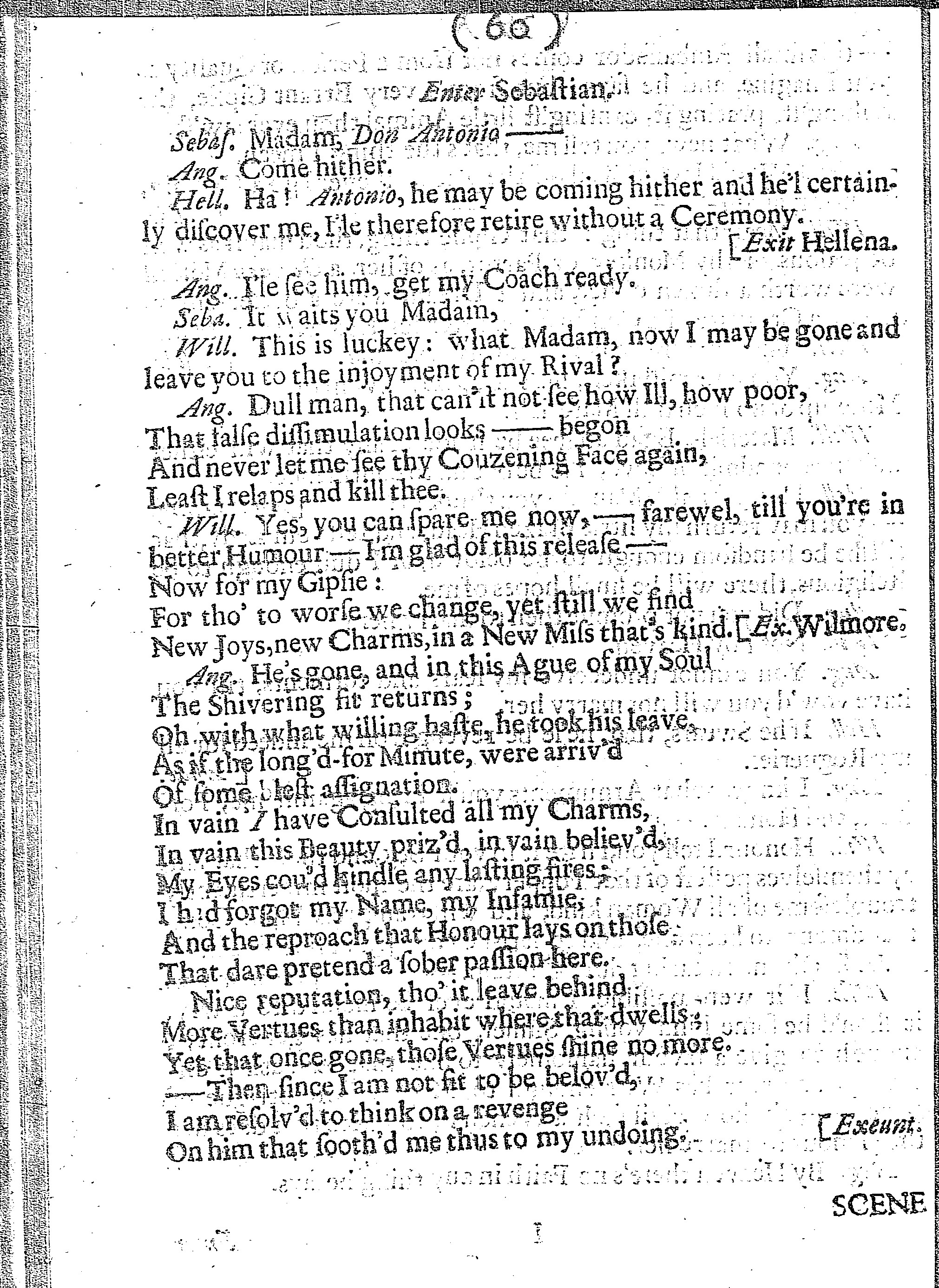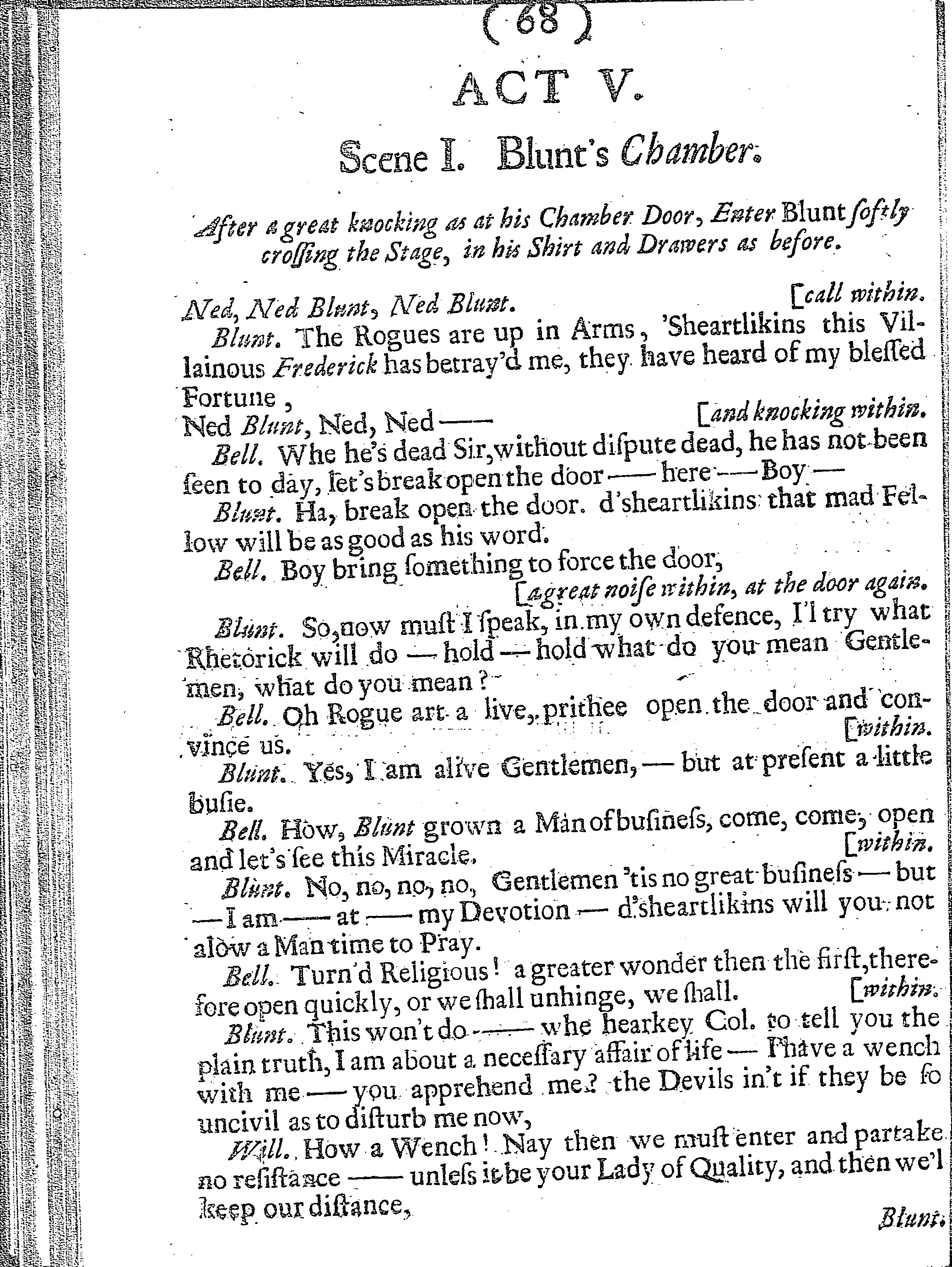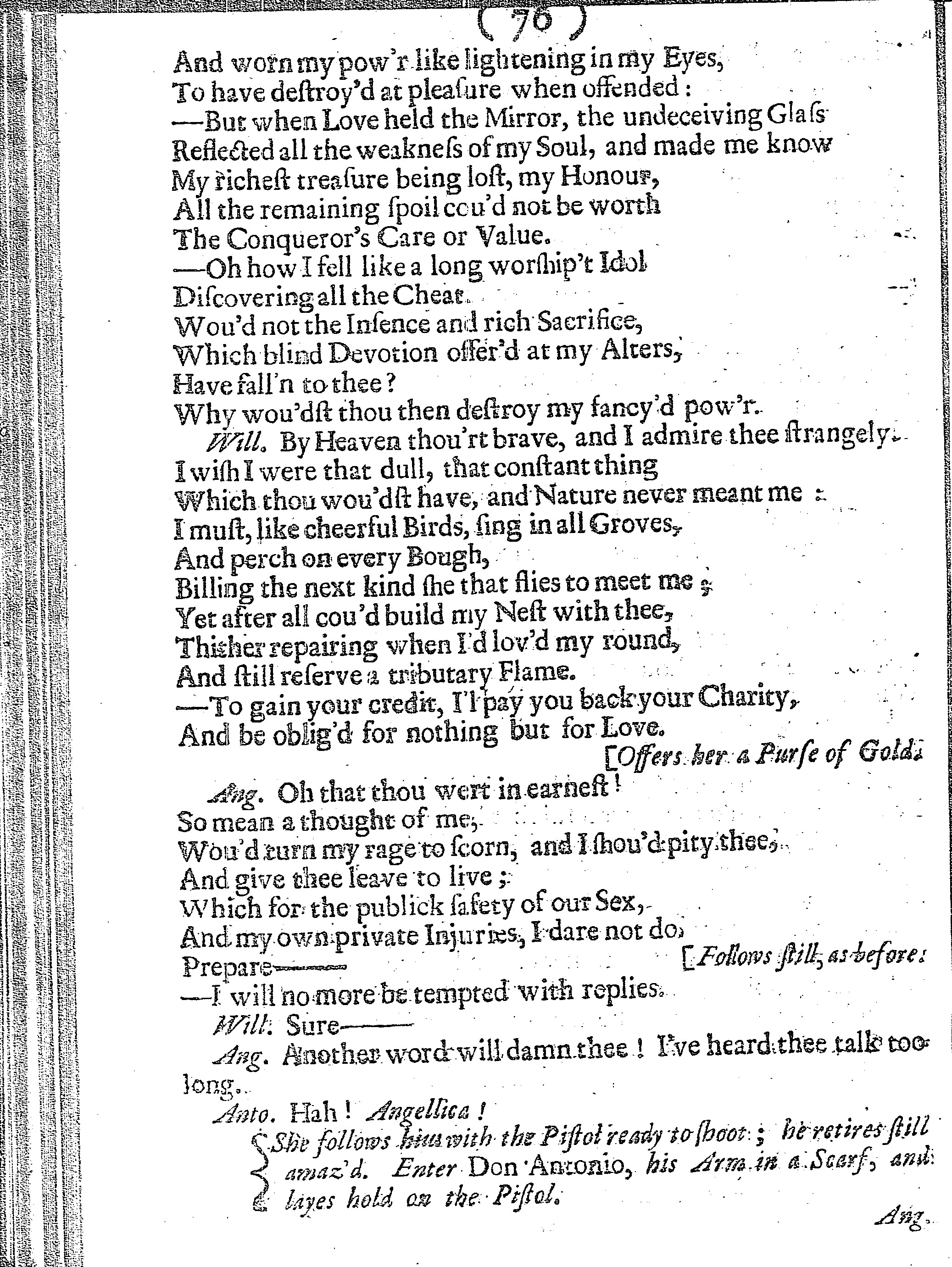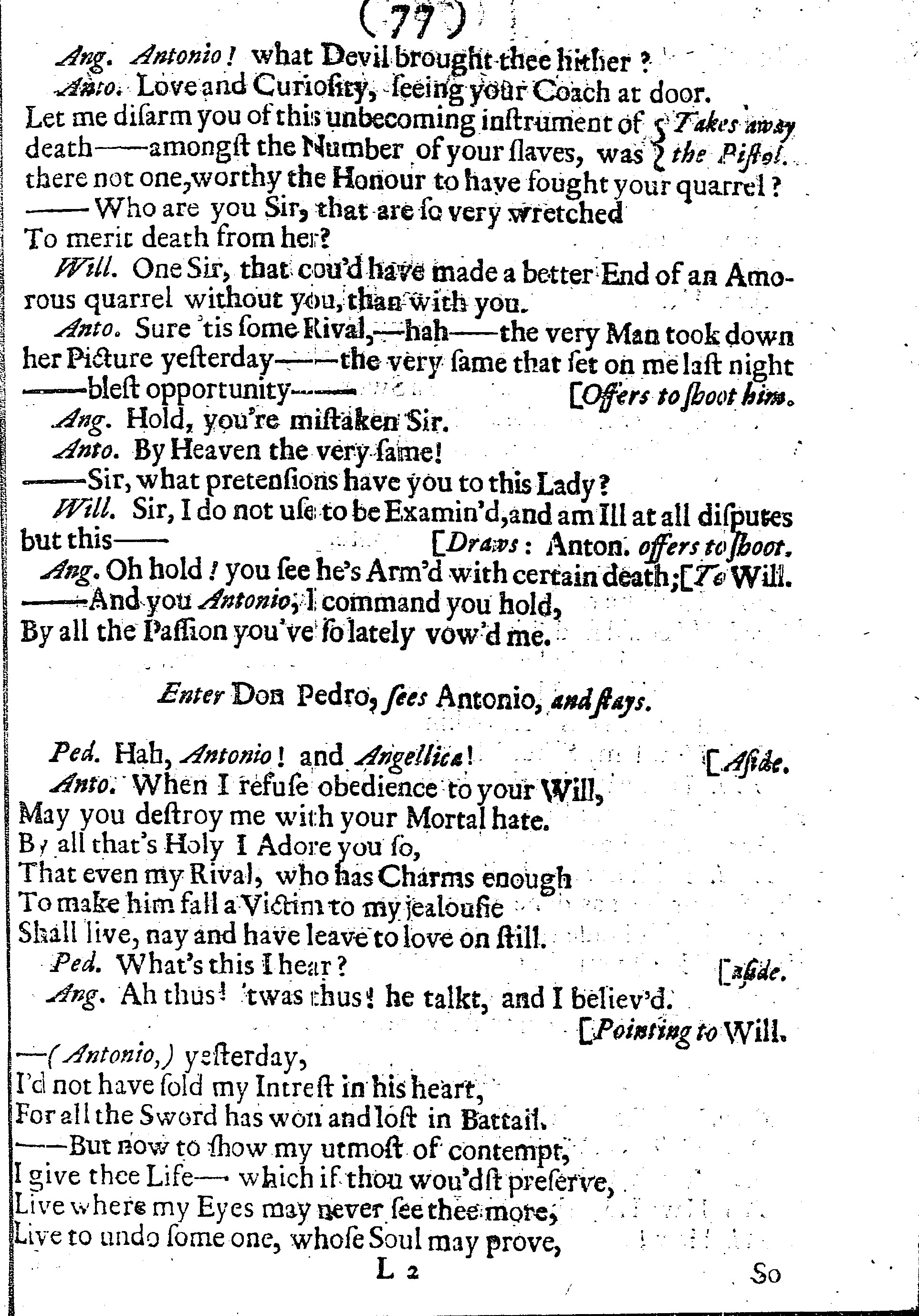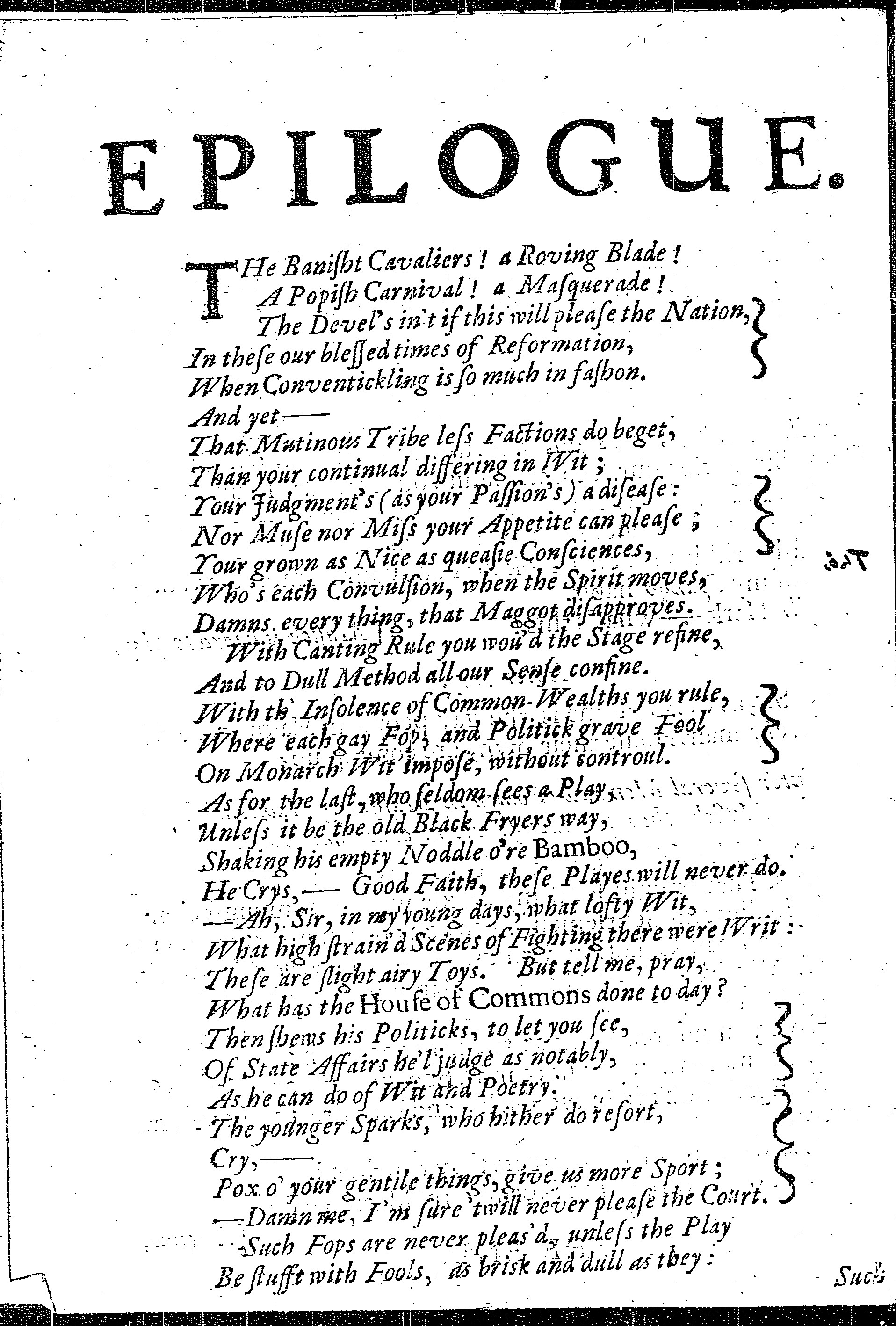The Rover, or, The Banished Cavaliers
By
Aphra Behn
ROVER.
OR,
The Banish't Cavaliers.
As it is ACTED
AT
His Royal Highness
THE
Duke's Theatre.
Licensed July 2d. 1677.
ROGER L'ESTRANGE.lestrange
LONDON,
Printed for John Amery,at the Peacock, against
St. Dunstan's Church in Fleet-street. 1677 ii PROLOGUE. WItts, like Physitians never can agree, When of a different Societie. And Rabels Dropsrabels were never more cry'd down By all the Learned Doctors of the Town, Than a New Play whose Author is unknown. Nor can those Doctors with more Malice sue (And powerful Purses) the discenting Few, Than those with an Insulting Pride, do raile At all who are not of their own Caballcabal: If a Young Poet hitt your Humour right, You judg him then out of Revenge and Spight. So amongst men there are Ridiculous Elves, Who Monkeys hate for being too like themselves. So that the reason of the grand debate, Why Witt so oft is damn'd, when good Plays take, Is, that you Censurecensure as you love, or hate. Thus like a Learned Conclave Poets sit, Catholique Judges both of Sense and Wit, And Damn or Save, as they themselves think fit. Yet those who to others faults are so severe, Are not so perfect but themselves may Erre. Some write Coractcoract indeed, but then the whole (Bating their own Dull stuff i'th' Play) is stole: As Bees do suck from Flowers their Honey dew, So they rob others striving to please you. Some write their Characters Gentile and fine, But then they do so Toyl for every line, iii That what to you does Easie seem, and Plain, Is the hard Issue of their labouring Brain. And some th' Effects of all their pains we see, Is but to Mimick good Extemporie. Others by long Converse about the Town, Have Witt enough to write a Lew'd Lampoon,lampoon But their chief skill lyes in a Bawdy Song. In short, the only Witt that's now in Fashon, Is but the gleenings of good Conversation. As for the Author of this Coming Play, I ask't him what he thought fit I shou'd say In thanks for your good Company to day: He call'd me Fool, and said it was well known, You came not here for our sakes, but your own. New Plays are stuff'd with Witts, and with Debochesdeboche, That Crowd and sweat like Citts, in May-Day Coachescitt. iv Some Books printed this Year 1677.ads For John Amery, at the Peacock; against St. Dunstan's Church in Fleet-streetstdunstans.
Advice to Grand Jurors in cases of Blood, Asserting from Law and Reason, That at the Kings Suitkingsuit in all cases (where a Person by Law is to be indicted for killing of another person) that the Indictment ought to be drawn for Murther, and that the Grand Jury ought to find it Murther, where the Evidence is, that the party intended to be indicted had his hands in Blood, and did kill the other Person. By Zachary Babington Esq 8o. price. 2 s. 6 d.
The Country Justice, Containing the practice of the Justices of the Peace, in and out of their Sessions, with an Abridgment of all Statutes relating thereunto to this present Year 1677. By Michael Dalton Esq Fol. price bound 12 s.
A Treatise of Testaments and last Wills, fit to be understood by all Men, that they may know, whether, whereof, and how, to make them. Compiled out of the Laws Ecclesiastical, Civil, and Cannon, as also out of the Common Laws, Customs and Statutes of this Realm. The fourth Edition, with very large Additions. By Henry Swynburne, sometimes Judge of the Prerogative Court of York, in large 4o. price bound 7 s.
The Debaucheé, or the Credulous Cuckold, a Comedy, Acted at His Highness the Duke's Theatre, in 4o. price 1 s.
Man without Passion, or the Wise Stoick, according to the Sentiments of Seneca, written Originally in French, by that great and Learned Philosopher Anthony Le Grand. English't by G. R. printed 1675. 8o. price 2 s. 6 d.
An Introduction to the History of England, comprising the principal Affairs of this Land, from its first planting, to the comeing of the English Saxons. Together with a Catalogue of the 76 British and Pictish Kings, by D. D. Langhorne. Printed 8o. price 2 s.
v The Actors Names.- Mr. Jevorne
- Don Antonio
- The Vice-Roy's Son.
- Mr. Medburne
- Don Pedro
- A Noble Spaniard,his Friend.
- Mr. Betterton
- Belville
- An English Colonel in Love with Florinda.
- Mr. Smith
- Willmore
- THE ROVERrover.
- Mr. Crosbie
- Frederick
- An English Gentleman, and Friend to Bel. and Frederick
- Mr. Underhill
- Blunt
- An English Country Gentleman.
- Mr. Richards
- Stephano
- Servant to Don Pedro.
- Mr. Percivall
- Philippo
- Lucetta's Gallant.
- Mr. John Lee
- Sancho
- Pimp to Lucetta.
- Biskey, and Sebastian,
- Two Bravo's toAngellica.
- Officers and Souldiers.
- Page
- To Don Antonio.
- Mrs. Betterton
- Florinda
- Sister to Don Pedro.
- Mrs. Barrer
- Hellena
- A gay Young woman design'd for a Nun, and Sister to Florinda.
- Mrs. Hughs
- Valeria
- A Kinswoman to Florinda.
- Mrs. Gwin
- Angellica Bianca
- A Famous Courtizan.
- Mrs. Leigh
- Moretta
- Her Woman.
- Mrs. Norris
- Callis
- Governess to Florinda and Hellena.
- Mrs. Gillo
- Lucetta
- A Jilting Wench.
- Servants, Other Masqueraders Men and Women.
ROVER:
OR,
The Banish't Cavaliers.intro ACT the First. Scene the First. A Chamber. Enter Florinda and Hellena.
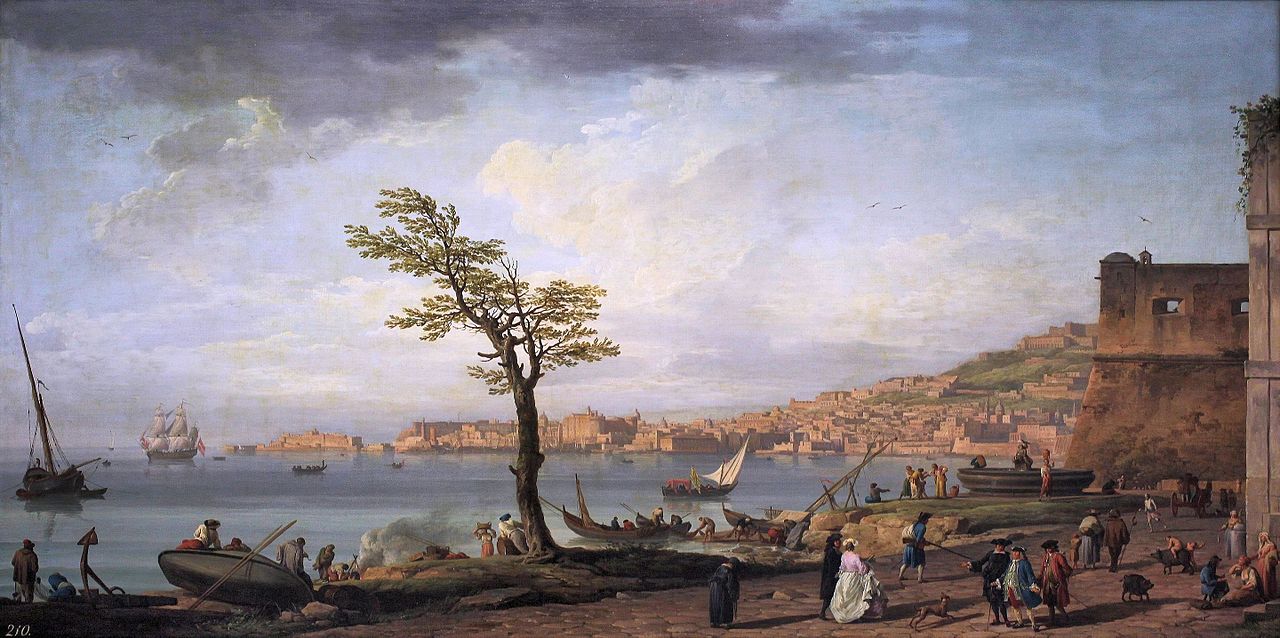 - [UVAstudstaff]
introA
rover is a pirate, or a person who aimlessly wanders and roams. The Cavaliers were
the supporters of the Stuart King Charles I in the English Civil War between him
and the Parliament, and after that, supporters of his son, Charles II, who went
into exile when the Stuarts lost the Civil War in 1659. This reference thus sets
the play some time in the 1650s, when the monarchy's supporters were scattered
across Europe, as these men are, trying to make their fortunes and/or biding their
time in the hopes of returning to England some day. First staged in 1677, The Rover is thus a kind of historical play, looking back on
an era a couple of decades earlier. It was based on an earlier play, Thomas
Killigrew's Thomaso, or the Wanderer, which was written
around 1654 while Killigrew was living in Madrid. Killigrew's play seems to have
been autobiographical, reflecting his life as a Royalist exile, a supporter of the
Stuart monarchy who was living on the European continent in the 1650s while
England was ruled by Oliver Cromwell and the Commonwealth government. Upon the
return of the Stuart monarchy in 1660, Killigrew received a patent to open a
theater in London as a reward for his loyalty to Charles II. He published Tomaso in 1664, but never staged it, perhaps recognizing
that it was far too long and disjointed to work on stage. We do not know how Behn
come to rework the play for performance, but it seems entirely possible that this
was at the request of Killigrew, who was the patent-holder of the Duke's Theater.
There are places where Behn follows Killigrew's play closely, but she made many
changes, compressing the original, and shifting the scene from Madrid to Naples.
Perhaps most notably, she beefs up the female roles of Angelica Bianca and
Hellena. Hellena is such an interesting and dynamic character in Behn's version of
the story that the audience is left wondering in the end who the real rover of the
play is: Willmore or Hellena? Behn's play has been popular with audiences ever
since it was first staged in 1677, and is now probably the
most-frequently-performed of her works. - [UVAstudstaff]
pritheeA contraction of "I pray thee," similar to "I beg of you." Source: Oxford
English Dictionary. - [UVAstudstaff]
fainBe
delighted or glad to. Source: Oxford English Dictionary. - [UVAstudstaff]
viceroyThe ruler or governor of a province. Source: Oxford English
Dictionary. - [UVAstudstaff]
angleseSpanish for an English person. - [UVAstudstaff]
gayFine or
noble. Source: Oxford English Dictionary. - [UVAstudstaff]
designIntended or designated. Source: Oxford English Dictionary. - [UVAstudstaff]
carnivalThe season before Lent, filled with celebration and festivity. A modern
equivalent would be Mardi Gras in New Orleans or Carnivale in Rio de Janeiro.
Hellena is going to take advantage of the opportunity provided by this brief
season of festivity before heading to a convent rather than marry a man she
loathes. - [UVAstudstaff]
cleanlimbdWell proportioned. Source: Oxford English
Dictionary. - [UVAstudstaff]
pamplonaPamplona is a city in the north of Spain, but it's not clear
what military action is being referred to here. There was a siege of Pamplona in
1521, but that was more than a century before the events depicted in the play.
More generally, however, it was true that during the 1650s, the time during which
the action of the play takes place, many English cavaliers were hiring themselves
out as mercenary soldiers to armies in contintental Europe, including Spain, so
placing military action at Pamplona is quite plausible. This is a detail that Behn
is lifting from Killigrew's play, so she probably has nothing particularly
significant in mind with the reference. - [UVAstudstaff]
horseFrench cavalry. Source: Oxford English Dictionary. - [UVAstudstaff]
habitCarnival disguise. - [UVAstudstaff]
slaveIt was customary in prominent families for the father to exert control over
whom the daughter marries. This was true in England, but setting the play in Italy
enables Behn to stage the conflict between the young women's wishes and their
father's control without openly criticizing her own culture. - [UVAstudstaff]
rancktRanked. Source: Oxford English Dictionary. - [UVAstudstaff]
jointureOr "jointure." The property or money given to the wife in marriage. Source:
Oxford English Dictionary. The amount of a jointure would have been negotiated
before the marriage by the two families involved. - [UVAstudstaff]
indiesThe West Indies or, more generally, the Americas. Source: Oxford English
Dictionary. - [UVAstudstaff]
baggsRiches, or money-bags. Source: Oxford English Dictionary. - [UVAstudstaff]
impotentThat is, he is probably impotent. - [UVAstudstaff]
dogdaysHottest part of the summer. Source: Oxford English Dictionary. - [UVAstudstaff]
sanchoKing of Pamplona during the 10th Century. Hellena's joke is that Don
Vincentio's furniture is going to be very old and outdated--like
himself. - [UVAstudstaff]
coxcombFool. Source: Oxford English Dictionary. - [UVAstudstaff]
valetPersonal attendant. Source: Oxford English Dictionary. - [UVAstudstaff]
threescoreScore denotes twenty, thus threescore indicates
sixty. - [UVAstudstaff]
hostelHostel de Dieu is French for Hostel or Hospital of God. The Hostel de Dieu was
a hospital that served the poor operating under a religious order. Source:
Wikipedia. - [UVAstudstaff]
lazerA
poor or diseased person. Source: Oxford English Dictionary. - [UVAstudstaff]
gambiaGambia, a region on the west coast of Africa where Europeans were active in
the slave trade from this period well into the 19th century. - [UVAstudstaff]
jesterReferring to the costume of court jesters, who wore bells on their heads and
carried bawbles. Source: Oxford English Dictionary. - [UVAstudstaff]
lentThe
period immediately after the carnival in the spring; a time of fasting and
penance. Source: Oxford English Dictionary. - [UVAstudstaff]
grateA cloistered nun would only be allowed to greet visitors from the world
outside the convent through a grate. - [UVAstudstaff]
colonelColonel. - [UVAstudstaff]
melancholyFredrick is implying that those who partake in Lent are
melencholy and unsatisfied, the traits that Belville is already displaying,
several days before Lent has officially started. - [UVAstudstaff]
interestInterest. - [UVAstudstaff]
courtPursue courtship. - [UVAstudstaff]
hogoes"A notable strong flavor or smell" Source: Oxford English
Dictionary. - [UVAstudstaff]
sauceSauce. - [UVAstudstaff]
oreOver. - [UVAstudstaff]
coathole"To find fault with one; to fix on some small offense as censurable"
(Dictionary of Phrase and Fable). - [UVAstudstaff]
charlesThis would be Prince Charles, who would become King Charles II
at the Restoration of the Stuart monarchy in 1660. - [UVAstudstaff]
chapmenPedlers (Oxford English Dictionary). - [UVAstudstaff]
rosesWillmore is reading one of the "papers" pinned on the dresses of the women,
which have enigmatic statements vaguely hinting at the womens' sexual
availability. - [UVAstudstaff]
bushA sexual
double-entendre; pubic hair. - [AJB]
pesthouseA hospital for people suffering from an infectious disease
(Oxford English Dictionary). - [UVAstudstaff]
cuckoldA husband who is being cheated on by his wife; traditionally, cuckolds were
said to wear horns as a sign of their being mastered by another, more virile
man. - [UVAstudstaff]
essexEssex was frequently a butt of jokes for Londoners, who saw it as a rural
backwater. - [UVAstudstaff]
piazzaOr Piazza; a public space or market square. - [UVAstudstaff]
newbridgeThe joke here is that the hangman has beaten the Frenchman in
their contest, just as the French beat the Dutch in theirs: a reference to an
incident in 1672, when Nieuwerbrug (New Bridge), a Dutch garrison post on a branch
of the Rhine, fell to the French. - [UVAstudstaff]
humorA
mixture of sharp wit and sarcastic comments. - [UVAstudstaff]
venusThe
Roman goddess of love, sex, fertility, and victory, Venus was, according to
mythology, born of sea-foam. - [UVAstudstaff]
oldlawThe Old Testament. - [UVAstudstaff]
jepthaIn the book of Judges, Jephtha, having won a major military victory, vows to
God that he will sacrifice the first thing he sees on his return home. When he
arrives, his daughter rushes out to greet him, and he realizes that he must kill
his daughter to fulfill his vow. She agrees, but asks for a reprieve of two months
to visit friends in the mountains and to lament the fact that she will die a
virgin. - [UVAstudstaff]
peruThat
is, Peru, where slaves worked in silver mines. - [UVAstudstaff]
maidA
female servant responsible for performing many household responsibilities,
including laundry. See Joanna Martin, Wives and Daughters: Women
and Children in the Georgian Country House (London: Hambledon and London,
2004). - [UVAstudstaff]
geldCastrate. - [UVAstudstaff]
paduanaA "Paduana" is someone who comes from the city of Padua. Many critics have
noted that Angellica Bianca shares initials with Aphra Behn. - [UVAstudstaff]
vizardA
simple mask; pictures attatched at the following link:
https://finds.org.uk/database/artefacts/record/id/402520. - [UVAstudstaff]
bottomhazardRisk in a single ship. - [UVAstudstaff]
basenessMembership or characteristic of a lower social class (OED). - [UVAstudstaff]
oftShortening of often (OED). - [UVAstudstaff]
errantTravelling or roaming (OED). - [UVAstudstaff]
cozeningAlso spelled cozening, it means cheating, deceitful or fraudulent
(OED). - [UVAstudstaff]
piccaroonA pirate or privateer (OED). - [UVAstudstaff]
antickIn dress or attire (OED). - [UVAstudstaff]
mewedIn
hiding or a place of confinement, like a cage (OED). - [UVAstudstaff]
wantonOf a person, a person's will: undisciplined, ungoverned; unmanageable,
rebellious (OED). - [UVAstudstaff]
bonarobaA wench (OED). - [UVAstudstaff]
spigotA
small wooden peg or pin used to stop the vent-hole of a barrel or cask; a
vent-peg; a similar peg inserted into and controlling the opening or tube of a
faucet and used to regulate the flow of liquor (OED). - [UVAstudstaff]
balderdashJumbled mixture of liquors e.g. beer and wine. - [UVAstudstaff]
sackA
general name for a class of white wines formerly imported from Spain and the
Canaries (OED). - [UVAstudstaff]
capuchinA friar of the order of St. Francis, of the new rule of 1528 (OED). - [UVAstudstaff]
collationBringing together, comparison (OED). - [UVAstudstaff]
perjuredOf a person that has deliberately broken an oath (OED). - [UVAstudstaff]
vizarThe
front part of a helmet, covering the face but provided with holes or openings to
admit of seeing and breathing, and capable of being raised and lowered
(OED). - [UVAstudstaff]
intercessionThe action of interceding or pleading on behalf of (rarely
against) (OED). - [UVAstudstaff]
sigherTo emit, give, or heave a sigh (OED). - [UVAstudstaff]
jewelAn
article of value used for adornment, chiefly of the person / possibly a picture of
her (OED). - [UVAstudstaff]
billPhrase meant to suggest that a promise or vow to be "paid" can be
counterfeited or easily passed from one to another (O'Brien in class /
Wikipedia). - [UVAstudstaff]
reposeTemporary rest or cessation from physical or mental exertion in order to
recover one's energy (OED). - [UVAstudstaff]
unmaskUnmask. - [UVAstudstaff]
sheheShe
and he respectively. - [UVAstudstaff]
businessHis womanizing has ended with her. - [UVAstudstaff]
budgetA
pouch, bag, wallet, usually of leather (OED). - [UVAstudstaff]
bonaroba2Italian for: A wench; ‘a showy wanton’ (OED). - [UVAstudstaff]
wheWhy
(http://www.bookwolf.com/Wolf/pdf/AphraBehn-TheRover.pdf). - [UVAstudstaff]
lyeSleep
with. - [UVAstudstaff]
religiouslyRefers to taking an oath on the bible / Oath: A solemn or
formal declaration invoking God (or a god, or other object of reverence) as
witness to the truth of a statement, or to the binding nature of a promise or
undertaking (OED). - [UVAstudstaff]
ageA long
time / A period of existence, and related senses (OED). - [UVAstudstaff]
dullDull:
Not quick in intelligence or mental perception; slow of understanding; not sharp
of wit (OED). - [UVAstudstaff]
poxSenses
relating to diseases characterized by pocks(OED). Referencing a sort of curse on
his vow. - [UVAstudstaff]
hark
"Hark ye"= (ref:http://www.bookwolf.com/Wolf/pdf/AphraBehn-TheRover.pdf). To give
ear or listen to (OED). - [UVAstudstaff]
beatbushHe thinks he has chased his lady into the arms of another man. To rouse the
birds that they may fly into the net held by some one else (OED). - [UVAstudstaff]
wineMetaphor to understand and subdue loves troubling nature by drinking one's
self to sleep. - [UVAstudstaff]
minuteHis plan to sleep with her is near completion. Compass: To plan, contrive,
devise (OED). Also: navigational reference meaning close in proximity: A compass
divided into 360 degrees is the most common unit of measurement. Each degree is
divided into 60 minutes, each minute into 60 seconds...those units are used for
precise locations using latitude and
longitude.(http://www.compassdude.com/compass-units.php). - [UVAstudstaff]
justiceAddressing his clothes, in England he could be "A magistrate appointed to hear
minor cases, grant licences, etc" (OED). - [UVAstudstaff]
commissionHis job or orders; Authority committed or entrusted to a
person (OED). - [UVAstudstaff]
dogLuckiest rogue. - [UVAstudstaff]
betrayDarkness necessary to setup the robbery of Blunt. - [UVAstudstaff]
anonIn a
short time; soon (CollinsDictionary). - [UVAstudstaff]
jestTrick; an exploit (OED). - [UVAstudstaff]
coyAnimal
trap (OED), if she had been trapped by Blunt's love. - [UVAstudstaff]
mollifiedThat has been mollified; appeased, conciliated; †softened,
rendered soft or supple; †made less severe; mitigated (OED). - [UVAstudstaff]
luteA
stringed musical instrument, much in vogue from the 14th to the 17th centuries.
Source: Oxford English Dictionary. - [UVAstudstaff]
breechesShort pants / Breeches are distinguished from trousers by coming only just
below the knee (OED). - [UVAstudstaff]
watchThe
first actual pocket watch was "said to have occurred in 1675 when Charles II of
England introduced waistcoats (Wikipedia).This would have been an incredibly
exepensive item. - [UVAstudstaff]
besseRefers to Queen Elizabeth I, reigned from 1558-1603.The quarrel from "Eighty
Eight" seems to refer to the Spanish Armada, which was destroyed in
1588. - [UVAstudstaff]
shoarSeems to refer to a sewer into which he entered. - [UVAstudstaff]
nosegayA bunch of flowers or herbs, especially those having a sweet
smell-OED. - [UVAstudstaff]
coylA
noise or disturbance, a 'row', a tumult. - [UVAstudstaff]
enduedImbued or transfused. - [UVAstudstaff]
skullReference to the common law of taking your victim as you find them
http://definitions.uslegal.com/t/thin-skull-rule/. - [UVAstudstaff]
picaroonA variant spelling of Picaroon meaning a rogue or a scoundrel. - [UVAstudstaff]
frigate A warship. - [UVAstudstaff]
chasegunA canon at the bow or stern of an armed ship used in pursuit Source:
Merriam-Webster. - [UVAstudstaff]
cloydClogged, cumbered, burdened (OED). - [UVAstudstaff]
wanton2Double meaning: to play and to behave in a sexually promiscuous
way. - [UVAstudstaff]
viragoA
wicked woman (OED). - [UVAstudstaff]
tramontana"Dwelling or situated beyond, or pertaining to the far side
of, the mountains (orig. and in reference to Italy, the Alps...hence,
foreign...occupied by a non-Italian." This word could also have, "the connotation
[of] 'uncouth, unpolished, barbarous'." ("tramontane, adj. and n." OED Online.
Oxford University Press, September 2016. Web. 5 December 2016.) - [UVAstudstaff]
parlous"In a parlous manner; esp. perilously, dangerously; precariously;
desperately," ("parlously, adv." OED Online. Oxford University Press, September
2016. Web. 5 December 2016.) - [UVAstudstaff]
gaffer"A term applied originally by country people to an elderly man or one whose
position entitled him to respect." Or, "Used simply as a title of address, often
with not intimation of respect," ("gaffer, n." OED Online. Oxford University
Press, September 2016. Web. 5 December 2016.) - [UVAstudstaff]
bugg"A
word meant to frighten or terrify; a word that causes dread," († bug-word |
bug's-word, n. OED Online. Oxford University Press, September 2016. Web. 5
December 2016.) - [UVAstudstaff]
incle"A
kind of linen tape, formerly much used for various purposes," ("inkle, n." OED
Online. Oxford University Press, September 2016. Web. 5 December 2016.) - [UVAstudstaff]
bayes"A
bag of bay leaves used in cooking." (Canfield, J. D., and Sneidern M.-L. Von. The
Broadview Anthology of Restoration and Early Eighteenth-Century Drama.
Peterborough, Ont: Broadview Press, 2004. Print). - [UVAstudstaff]
castA
look or view ("cast, n." OED Online. Oxford University Press, September 2016. Web.
5 December 2016.). - [UVAstudstaff]
ConventicklingA religious meeting of an unsanctioned or clandestine
nature ("conventicle, n." OED Online. Oxford University Press, September 2016.
Web. 5 December 2016.). - [UVAstudstaff]
cantingHypocritical ("ˈcanting, adj.2." OED Online. Oxford University Press,
September 2016. Web. 5 December 2016.). - [UVAstudstaff]
blackfriarsA major London theater in which the Shakespeare company
performed during the winter until 1642, when all the playhouses were closed (Gurr,
Andrew. "London’s Blackfriars Playhouse and the Chamberlains Men’." Inside
Shakespeare: Essays on the Blackfriars Stage (2006): 17-33.). - [UVAstudstaff]
noddleHead ("noddle, n.1." OED Online. Oxford University Press, September 2016. Web.
5 December 2016.). - [UVAstudstaff]
sparksA
foppish, affected type of man ("spark, n.2." OED Online. Oxford University Press,
September 2016. Web. 5 December 2016.). - [UVAstudstaff]
nokesJames Stokes and Anthony Leigh were celebrated comic actors of the period,
often appearing alongside one another (Chernaik, Warren. “Nokes , James
(c.1642–1696).” Warren Chernaik Oxford Dictionary of National Biography. Ed. H. C.
G. Matthew and Brian Harrison. Oxford: OUP, 2004. Online ed. Ed. David Cannadine.
Jan. 2008. 5 Dec. 2016). - [UVAstudstaff]
thomasoThe Rover borrows heavily from Thomas Killigrew's Thomaso, or,
The Wanderer, though Behn seems to minimize the extent to which she borrowed from
it here (DeRitter, Jones. "The Gypsy," The Rover", and the Wanderer: Aphra Behn's
Revision of Thomas Killigrew." Restoration: Studies in English Literary Culture,
1660-1700 10.2 (1986): 82-92.). - [UVAstudstaff]
- [UVAstudstaff]
introA
rover is a pirate, or a person who aimlessly wanders and roams. The Cavaliers were
the supporters of the Stuart King Charles I in the English Civil War between him
and the Parliament, and after that, supporters of his son, Charles II, who went
into exile when the Stuarts lost the Civil War in 1659. This reference thus sets
the play some time in the 1650s, when the monarchy's supporters were scattered
across Europe, as these men are, trying to make their fortunes and/or biding their
time in the hopes of returning to England some day. First staged in 1677, The Rover is thus a kind of historical play, looking back on
an era a couple of decades earlier. It was based on an earlier play, Thomas
Killigrew's Thomaso, or the Wanderer, which was written
around 1654 while Killigrew was living in Madrid. Killigrew's play seems to have
been autobiographical, reflecting his life as a Royalist exile, a supporter of the
Stuart monarchy who was living on the European continent in the 1650s while
England was ruled by Oliver Cromwell and the Commonwealth government. Upon the
return of the Stuart monarchy in 1660, Killigrew received a patent to open a
theater in London as a reward for his loyalty to Charles II. He published Tomaso in 1664, but never staged it, perhaps recognizing
that it was far too long and disjointed to work on stage. We do not know how Behn
come to rework the play for performance, but it seems entirely possible that this
was at the request of Killigrew, who was the patent-holder of the Duke's Theater.
There are places where Behn follows Killigrew's play closely, but she made many
changes, compressing the original, and shifting the scene from Madrid to Naples.
Perhaps most notably, she beefs up the female roles of Angelica Bianca and
Hellena. Hellena is such an interesting and dynamic character in Behn's version of
the story that the audience is left wondering in the end who the real rover of the
play is: Willmore or Hellena? Behn's play has been popular with audiences ever
since it was first staged in 1677, and is now probably the
most-frequently-performed of her works. - [UVAstudstaff]
pritheeA contraction of "I pray thee," similar to "I beg of you." Source: Oxford
English Dictionary. - [UVAstudstaff]
fainBe
delighted or glad to. Source: Oxford English Dictionary. - [UVAstudstaff]
viceroyThe ruler or governor of a province. Source: Oxford English
Dictionary. - [UVAstudstaff]
angleseSpanish for an English person. - [UVAstudstaff]
gayFine or
noble. Source: Oxford English Dictionary. - [UVAstudstaff]
designIntended or designated. Source: Oxford English Dictionary. - [UVAstudstaff]
carnivalThe season before Lent, filled with celebration and festivity. A modern
equivalent would be Mardi Gras in New Orleans or Carnivale in Rio de Janeiro.
Hellena is going to take advantage of the opportunity provided by this brief
season of festivity before heading to a convent rather than marry a man she
loathes. - [UVAstudstaff]
cleanlimbdWell proportioned. Source: Oxford English
Dictionary. - [UVAstudstaff]
pamplonaPamplona is a city in the north of Spain, but it's not clear
what military action is being referred to here. There was a siege of Pamplona in
1521, but that was more than a century before the events depicted in the play.
More generally, however, it was true that during the 1650s, the time during which
the action of the play takes place, many English cavaliers were hiring themselves
out as mercenary soldiers to armies in contintental Europe, including Spain, so
placing military action at Pamplona is quite plausible. This is a detail that Behn
is lifting from Killigrew's play, so she probably has nothing particularly
significant in mind with the reference. - [UVAstudstaff]
horseFrench cavalry. Source: Oxford English Dictionary. - [UVAstudstaff]
habitCarnival disguise. - [UVAstudstaff]
slaveIt was customary in prominent families for the father to exert control over
whom the daughter marries. This was true in England, but setting the play in Italy
enables Behn to stage the conflict between the young women's wishes and their
father's control without openly criticizing her own culture. - [UVAstudstaff]
rancktRanked. Source: Oxford English Dictionary. - [UVAstudstaff]
jointureOr "jointure." The property or money given to the wife in marriage. Source:
Oxford English Dictionary. The amount of a jointure would have been negotiated
before the marriage by the two families involved. - [UVAstudstaff]
indiesThe West Indies or, more generally, the Americas. Source: Oxford English
Dictionary. - [UVAstudstaff]
baggsRiches, or money-bags. Source: Oxford English Dictionary. - [UVAstudstaff]
impotentThat is, he is probably impotent. - [UVAstudstaff]
dogdaysHottest part of the summer. Source: Oxford English Dictionary. - [UVAstudstaff]
sanchoKing of Pamplona during the 10th Century. Hellena's joke is that Don
Vincentio's furniture is going to be very old and outdated--like
himself. - [UVAstudstaff]
coxcombFool. Source: Oxford English Dictionary. - [UVAstudstaff]
valetPersonal attendant. Source: Oxford English Dictionary. - [UVAstudstaff]
threescoreScore denotes twenty, thus threescore indicates
sixty. - [UVAstudstaff]
hostelHostel de Dieu is French for Hostel or Hospital of God. The Hostel de Dieu was
a hospital that served the poor operating under a religious order. Source:
Wikipedia. - [UVAstudstaff]
lazerA
poor or diseased person. Source: Oxford English Dictionary. - [UVAstudstaff]
gambiaGambia, a region on the west coast of Africa where Europeans were active in
the slave trade from this period well into the 19th century. - [UVAstudstaff]
jesterReferring to the costume of court jesters, who wore bells on their heads and
carried bawbles. Source: Oxford English Dictionary. - [UVAstudstaff]
lentThe
period immediately after the carnival in the spring; a time of fasting and
penance. Source: Oxford English Dictionary. - [UVAstudstaff]
grateA cloistered nun would only be allowed to greet visitors from the world
outside the convent through a grate. - [UVAstudstaff]
colonelColonel. - [UVAstudstaff]
melancholyFredrick is implying that those who partake in Lent are
melencholy and unsatisfied, the traits that Belville is already displaying,
several days before Lent has officially started. - [UVAstudstaff]
interestInterest. - [UVAstudstaff]
courtPursue courtship. - [UVAstudstaff]
hogoes"A notable strong flavor or smell" Source: Oxford English
Dictionary. - [UVAstudstaff]
sauceSauce. - [UVAstudstaff]
oreOver. - [UVAstudstaff]
coathole"To find fault with one; to fix on some small offense as censurable"
(Dictionary of Phrase and Fable). - [UVAstudstaff]
charlesThis would be Prince Charles, who would become King Charles II
at the Restoration of the Stuart monarchy in 1660. - [UVAstudstaff]
chapmenPedlers (Oxford English Dictionary). - [UVAstudstaff]
rosesWillmore is reading one of the "papers" pinned on the dresses of the women,
which have enigmatic statements vaguely hinting at the womens' sexual
availability. - [UVAstudstaff]
bushA sexual
double-entendre; pubic hair. - [AJB]
pesthouseA hospital for people suffering from an infectious disease
(Oxford English Dictionary). - [UVAstudstaff]
cuckoldA husband who is being cheated on by his wife; traditionally, cuckolds were
said to wear horns as a sign of their being mastered by another, more virile
man. - [UVAstudstaff]
essexEssex was frequently a butt of jokes for Londoners, who saw it as a rural
backwater. - [UVAstudstaff]
piazzaOr Piazza; a public space or market square. - [UVAstudstaff]
newbridgeThe joke here is that the hangman has beaten the Frenchman in
their contest, just as the French beat the Dutch in theirs: a reference to an
incident in 1672, when Nieuwerbrug (New Bridge), a Dutch garrison post on a branch
of the Rhine, fell to the French. - [UVAstudstaff]
humorA
mixture of sharp wit and sarcastic comments. - [UVAstudstaff]
venusThe
Roman goddess of love, sex, fertility, and victory, Venus was, according to
mythology, born of sea-foam. - [UVAstudstaff]
oldlawThe Old Testament. - [UVAstudstaff]
jepthaIn the book of Judges, Jephtha, having won a major military victory, vows to
God that he will sacrifice the first thing he sees on his return home. When he
arrives, his daughter rushes out to greet him, and he realizes that he must kill
his daughter to fulfill his vow. She agrees, but asks for a reprieve of two months
to visit friends in the mountains and to lament the fact that she will die a
virgin. - [UVAstudstaff]
peruThat
is, Peru, where slaves worked in silver mines. - [UVAstudstaff]
maidA
female servant responsible for performing many household responsibilities,
including laundry. See Joanna Martin, Wives and Daughters: Women
and Children in the Georgian Country House (London: Hambledon and London,
2004). - [UVAstudstaff]
geldCastrate. - [UVAstudstaff]
paduanaA "Paduana" is someone who comes from the city of Padua. Many critics have
noted that Angellica Bianca shares initials with Aphra Behn. - [UVAstudstaff]
vizardA
simple mask; pictures attatched at the following link:
https://finds.org.uk/database/artefacts/record/id/402520. - [UVAstudstaff]
bottomhazardRisk in a single ship. - [UVAstudstaff]
basenessMembership or characteristic of a lower social class (OED). - [UVAstudstaff]
oftShortening of often (OED). - [UVAstudstaff]
errantTravelling or roaming (OED). - [UVAstudstaff]
cozeningAlso spelled cozening, it means cheating, deceitful or fraudulent
(OED). - [UVAstudstaff]
piccaroonA pirate or privateer (OED). - [UVAstudstaff]
antickIn dress or attire (OED). - [UVAstudstaff]
mewedIn
hiding or a place of confinement, like a cage (OED). - [UVAstudstaff]
wantonOf a person, a person's will: undisciplined, ungoverned; unmanageable,
rebellious (OED). - [UVAstudstaff]
bonarobaA wench (OED). - [UVAstudstaff]
spigotA
small wooden peg or pin used to stop the vent-hole of a barrel or cask; a
vent-peg; a similar peg inserted into and controlling the opening or tube of a
faucet and used to regulate the flow of liquor (OED). - [UVAstudstaff]
balderdashJumbled mixture of liquors e.g. beer and wine. - [UVAstudstaff]
sackA
general name for a class of white wines formerly imported from Spain and the
Canaries (OED). - [UVAstudstaff]
capuchinA friar of the order of St. Francis, of the new rule of 1528 (OED). - [UVAstudstaff]
collationBringing together, comparison (OED). - [UVAstudstaff]
perjuredOf a person that has deliberately broken an oath (OED). - [UVAstudstaff]
vizarThe
front part of a helmet, covering the face but provided with holes or openings to
admit of seeing and breathing, and capable of being raised and lowered
(OED). - [UVAstudstaff]
intercessionThe action of interceding or pleading on behalf of (rarely
against) (OED). - [UVAstudstaff]
sigherTo emit, give, or heave a sigh (OED). - [UVAstudstaff]
jewelAn
article of value used for adornment, chiefly of the person / possibly a picture of
her (OED). - [UVAstudstaff]
billPhrase meant to suggest that a promise or vow to be "paid" can be
counterfeited or easily passed from one to another (O'Brien in class /
Wikipedia). - [UVAstudstaff]
reposeTemporary rest or cessation from physical or mental exertion in order to
recover one's energy (OED). - [UVAstudstaff]
unmaskUnmask. - [UVAstudstaff]
sheheShe
and he respectively. - [UVAstudstaff]
businessHis womanizing has ended with her. - [UVAstudstaff]
budgetA
pouch, bag, wallet, usually of leather (OED). - [UVAstudstaff]
bonaroba2Italian for: A wench; ‘a showy wanton’ (OED). - [UVAstudstaff]
wheWhy
(http://www.bookwolf.com/Wolf/pdf/AphraBehn-TheRover.pdf). - [UVAstudstaff]
lyeSleep
with. - [UVAstudstaff]
religiouslyRefers to taking an oath on the bible / Oath: A solemn or
formal declaration invoking God (or a god, or other object of reverence) as
witness to the truth of a statement, or to the binding nature of a promise or
undertaking (OED). - [UVAstudstaff]
ageA long
time / A period of existence, and related senses (OED). - [UVAstudstaff]
dullDull:
Not quick in intelligence or mental perception; slow of understanding; not sharp
of wit (OED). - [UVAstudstaff]
poxSenses
relating to diseases characterized by pocks(OED). Referencing a sort of curse on
his vow. - [UVAstudstaff]
hark
"Hark ye"= (ref:http://www.bookwolf.com/Wolf/pdf/AphraBehn-TheRover.pdf). To give
ear or listen to (OED). - [UVAstudstaff]
beatbushHe thinks he has chased his lady into the arms of another man. To rouse the
birds that they may fly into the net held by some one else (OED). - [UVAstudstaff]
wineMetaphor to understand and subdue loves troubling nature by drinking one's
self to sleep. - [UVAstudstaff]
minuteHis plan to sleep with her is near completion. Compass: To plan, contrive,
devise (OED). Also: navigational reference meaning close in proximity: A compass
divided into 360 degrees is the most common unit of measurement. Each degree is
divided into 60 minutes, each minute into 60 seconds...those units are used for
precise locations using latitude and
longitude.(http://www.compassdude.com/compass-units.php). - [UVAstudstaff]
justiceAddressing his clothes, in England he could be "A magistrate appointed to hear
minor cases, grant licences, etc" (OED). - [UVAstudstaff]
commissionHis job or orders; Authority committed or entrusted to a
person (OED). - [UVAstudstaff]
dogLuckiest rogue. - [UVAstudstaff]
betrayDarkness necessary to setup the robbery of Blunt. - [UVAstudstaff]
anonIn a
short time; soon (CollinsDictionary). - [UVAstudstaff]
jestTrick; an exploit (OED). - [UVAstudstaff]
coyAnimal
trap (OED), if she had been trapped by Blunt's love. - [UVAstudstaff]
mollifiedThat has been mollified; appeased, conciliated; †softened,
rendered soft or supple; †made less severe; mitigated (OED). - [UVAstudstaff]
luteA
stringed musical instrument, much in vogue from the 14th to the 17th centuries.
Source: Oxford English Dictionary. - [UVAstudstaff]
breechesShort pants / Breeches are distinguished from trousers by coming only just
below the knee (OED). - [UVAstudstaff]
watchThe
first actual pocket watch was "said to have occurred in 1675 when Charles II of
England introduced waistcoats (Wikipedia).This would have been an incredibly
exepensive item. - [UVAstudstaff]
besseRefers to Queen Elizabeth I, reigned from 1558-1603.The quarrel from "Eighty
Eight" seems to refer to the Spanish Armada, which was destroyed in
1588. - [UVAstudstaff]
shoarSeems to refer to a sewer into which he entered. - [UVAstudstaff]
nosegayA bunch of flowers or herbs, especially those having a sweet
smell-OED. - [UVAstudstaff]
coylA
noise or disturbance, a 'row', a tumult. - [UVAstudstaff]
enduedImbued or transfused. - [UVAstudstaff]
skullReference to the common law of taking your victim as you find them
http://definitions.uslegal.com/t/thin-skull-rule/. - [UVAstudstaff]
picaroonA variant spelling of Picaroon meaning a rogue or a scoundrel. - [UVAstudstaff]
frigate A warship. - [UVAstudstaff]
chasegunA canon at the bow or stern of an armed ship used in pursuit Source:
Merriam-Webster. - [UVAstudstaff]
cloydClogged, cumbered, burdened (OED). - [UVAstudstaff]
wanton2Double meaning: to play and to behave in a sexually promiscuous
way. - [UVAstudstaff]
viragoA
wicked woman (OED). - [UVAstudstaff]
tramontana"Dwelling or situated beyond, or pertaining to the far side
of, the mountains (orig. and in reference to Italy, the Alps...hence,
foreign...occupied by a non-Italian." This word could also have, "the connotation
[of] 'uncouth, unpolished, barbarous'." ("tramontane, adj. and n." OED Online.
Oxford University Press, September 2016. Web. 5 December 2016.) - [UVAstudstaff]
parlous"In a parlous manner; esp. perilously, dangerously; precariously;
desperately," ("parlously, adv." OED Online. Oxford University Press, September
2016. Web. 5 December 2016.) - [UVAstudstaff]
gaffer"A term applied originally by country people to an elderly man or one whose
position entitled him to respect." Or, "Used simply as a title of address, often
with not intimation of respect," ("gaffer, n." OED Online. Oxford University
Press, September 2016. Web. 5 December 2016.) - [UVAstudstaff]
bugg"A
word meant to frighten or terrify; a word that causes dread," († bug-word |
bug's-word, n. OED Online. Oxford University Press, September 2016. Web. 5
December 2016.) - [UVAstudstaff]
incle"A
kind of linen tape, formerly much used for various purposes," ("inkle, n." OED
Online. Oxford University Press, September 2016. Web. 5 December 2016.) - [UVAstudstaff]
bayes"A
bag of bay leaves used in cooking." (Canfield, J. D., and Sneidern M.-L. Von. The
Broadview Anthology of Restoration and Early Eighteenth-Century Drama.
Peterborough, Ont: Broadview Press, 2004. Print). - [UVAstudstaff]
castA
look or view ("cast, n." OED Online. Oxford University Press, September 2016. Web.
5 December 2016.). - [UVAstudstaff]
ConventicklingA religious meeting of an unsanctioned or clandestine
nature ("conventicle, n." OED Online. Oxford University Press, September 2016.
Web. 5 December 2016.). - [UVAstudstaff]
cantingHypocritical ("ˈcanting, adj.2." OED Online. Oxford University Press,
September 2016. Web. 5 December 2016.). - [UVAstudstaff]
blackfriarsA major London theater in which the Shakespeare company
performed during the winter until 1642, when all the playhouses were closed (Gurr,
Andrew. "London’s Blackfriars Playhouse and the Chamberlains Men’." Inside
Shakespeare: Essays on the Blackfriars Stage (2006): 17-33.). - [UVAstudstaff]
noddleHead ("noddle, n.1." OED Online. Oxford University Press, September 2016. Web.
5 December 2016.). - [UVAstudstaff]
sparksA
foppish, affected type of man ("spark, n.2." OED Online. Oxford University Press,
September 2016. Web. 5 December 2016.). - [UVAstudstaff]
nokesJames Stokes and Anthony Leigh were celebrated comic actors of the period,
often appearing alongside one another (Chernaik, Warren. “Nokes , James
(c.1642–1696).” Warren Chernaik Oxford Dictionary of National Biography. Ed. H. C.
G. Matthew and Brian Harrison. Oxford: OUP, 2004. Online ed. Ed. David Cannadine.
Jan. 2008. 5 Dec. 2016). - [UVAstudstaff]
thomasoThe Rover borrows heavily from Thomas Killigrew's Thomaso, or,
The Wanderer, though Behn seems to minimize the extent to which she borrowed from
it here (DeRitter, Jones. "The Gypsy," The Rover", and the Wanderer: Aphra Behn's
Revision of Thomas Killigrew." Restoration: Studies in English Literary Culture,
1660-1700 10.2 (1986): 82-92.). - [UVAstudstaff]
Footnotes



























